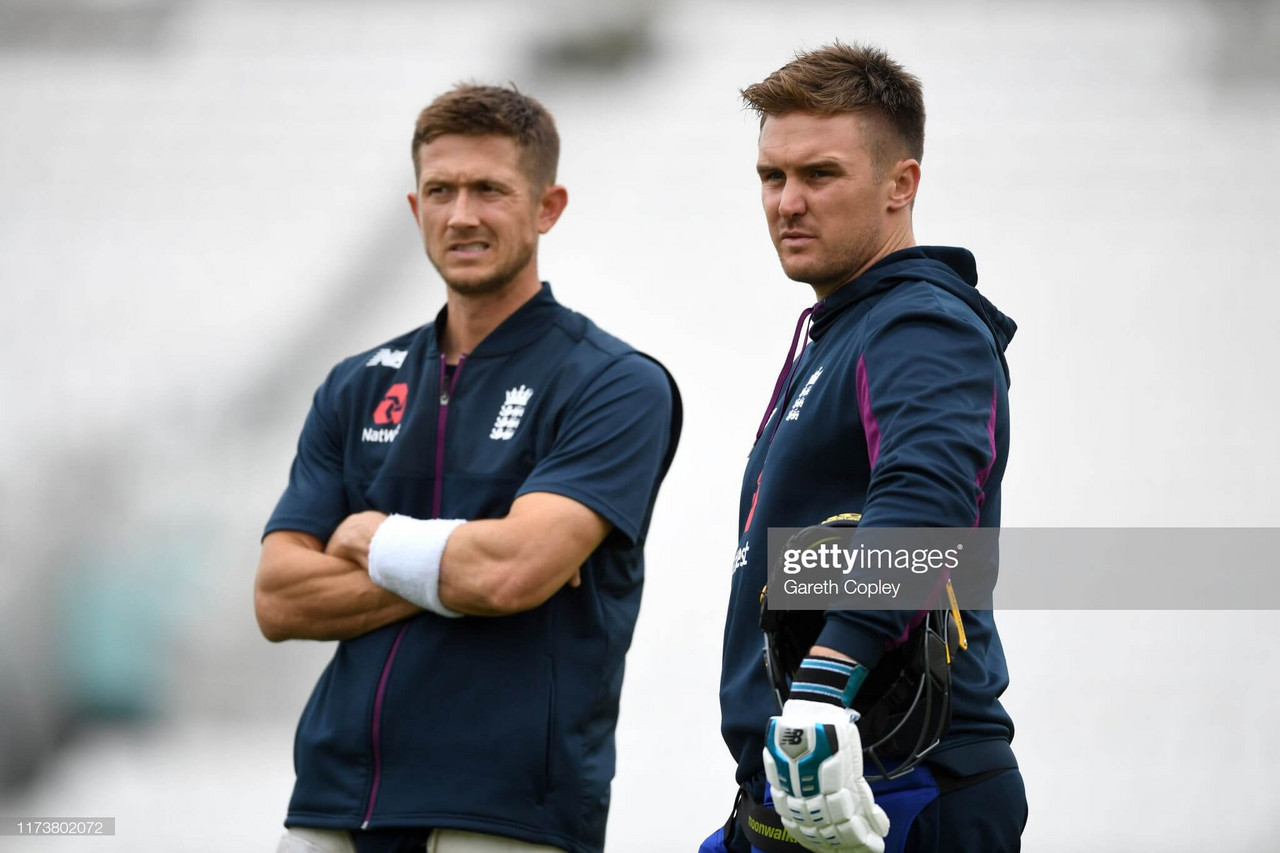Just desserts
England have had this coming for some time now. Unable to rely on the brilliance of Jimmy Anderson to bail them out in home conditions, as they have countless times before, this is the end product of a side which promises so much but has seemed a little lost for the last 18 months.
Losing the Ashes at home is the nadir for any England side, and in particular one that boasts one of the finest batsmen the country has produced and one of the greatest pace bowlers in the country’s history. Even without the very best of those bowlers in Anderson, England should not have struggled as they have.
It has been a competitive series and there’s no doubt, as they travel south to the Oval, that Joe Root’s men will attempt to find consolation in the fact that freakish form from a freakish batsman has largely been the difference between England and this, quite frankly average, Australia side.
But that in itself is alarming. England are, in their current iteration, a very average side. In English conditions these are two very evenly matched teams, with a big Steve Smith sized gap separating them. Yet England have spent much of the series playing catch up to Tim Paine’s tourists. They failed to capitalise on a first innings lead in the first test- if even Matthew Wade scores a hundred then that speaks volumes- and whilst they had Australia on the back foot on day five at Lords, since that breach of Fortress Edgbaston England’s series has always had the feeling of trailing behind the tourists.
Familiar patterns
Not that this should be surprising to anyone, least of all England themselves. They have set themselves up for failure with a recent history littered with decisions that can only be described as incompetent. Harsh as it may sound, picking a white ball specialist leg spinner over a finger spinner with an excellent first class record against India last summer was a dreadful decision. Likewise dropping a brilliant wicket keeper who averaged 41 from his first five tests for an inferior keeper who has averaged under 29 since 2017, and in much the same way as picking a white ball specialist opener who averages 36 batting in the middle order in County cricket to open in the Ashes against Pat Cummins and co. Don’t even mention picking a batsman, who had previously failed in test cricket, based on his IPL exploits and then making him vice captain.
And then there’s the batting collapses. 58 all out in New Zealand last year. 77 all out against the Windies in January. 85 all out facing Ireland at Lords just days before the Ashes started. That comes amongst a myriad of sub-par scores over the last four years as England have focused their attentions on the white ball formats, patience and spending time at the crease be damned.
So when England were dismantled for 67 all out in the first innings at Headingley, it wasn’t even particularly shocking. When England could only make 146 in their second dig at Edgbaston, after Australia had racked up 487/7 in theirs, it was merely eye roll inducing. England have created their own problems, like a boy lost in a shopping centre after wandering off from his mum. Over the last month all of England’s minor problems in recent years, that in the last 18 months have snowballed into glaring issues, have been exposed and exploded on the biggest stage.
The curious case of Joe Denly epitomises these issues. A 33 year old batsman averaging 36 in first class cricket, and part time leg spinner, picked for the tour of Sri Lanka because he can bowl a bit, and then given his debut in the West Indies. Picked at number three for the Ashes so Root can bat at four, before switching with Root so he feels more comfortable at four, before being bumped up to open to protect a man who should never really have been in the side in the first place. England’s batting problems in a microcosm. Muddled, incomprehensible, and insufficient.
Not that Denly himself has done particularly badly- of the three or four batsmen under scrutiny, he is the one who has arguably stood tallest in tough times. Jos Buttler, yet another white ball specialist shoehorned into a side that lacks an identity, is perhaps the one feeling the heat the most after meagre returns so far this summer. He, like Denly, has been shifted up and down the order in an attempt to fit square pegs into round holes. Talented pegs, but square nonetheless. Not that the bowling attack escaped Ed Smith’s wayward thinking either. The selection of Craig Overton raised eyebrows, and then didn’t when he was largely ineffective at Old Trafford.
How to fix England
England have spent too long trying to reinvent the wheel, and now have reached a stage where they must reinvent themselves. The decision, heading into a difficult winter tour of New Zealand then South Africa, must be whether it is a complete overhaul or a more practical reboot. Have England tried turning it off and on again?
If they go with the former option, however tempting it may be when held up against the success of the ODI team in the last four years, it brings problems of its own. Joe Root can not reasonably be expected to lead a completely overhauled and stripped down team when he was its predecessor’s captain, nor would he be the right man to do so. A fresh start would have to be exactly that, new captain and all. Considering how the captaincy appears to have affected Root’s form, and knowing the potential he has, it seems almost worth stripping him of the captaincy just to allow him to concentrate on his batting. The question is who takes over? Jos Buttler has leadership qualities in abundance, and experience with the ODI team, but doesn’t have a secure spot in the side, and beyond him there are few obvious candidates. Change for the sake of change will only damage the side further if it is not done properly.
So that leaves England facing a reboot with Root still at the helm. Changes will still have to be made, certainly, both in personnel and approach. Young players performing well in the County Championship such as Dom Sibley and Ollie Pope, ignored this summer despite gluttonous run returns, can no longer be made to wait on the fringes of the side whilst the likes of Roy, Buttler and Jonny Bairstow clog up the top seven. There can be no more Sam Northeasts, forever churning out runs and never looked at twice.
Following the ODI blueprint
England, ironically, have the blueprint they can follow in the way they remodelled the one day side. Whilst that did involve a change of captain, the key was the change of approach in terms of selection, preparation and style. Eoin Morgan was picked not for the sake of change but because he was the right man to lead a new, stylish, swashbuckling side- a side in his image. The domestic season was centred around playing as much white ball cricket in the height of summer as possible, and players were picked based on good performances in the respective domestic tournaments. A head coach whose main priority was the shorter formats was brought in. They pick their best players and are ruthless in dropping under performers. There is no room for sentiment. Compare and contrast to the test side and it is easy to see where things have gone wrong.
If the ECB are serious about making England a force in test cricket again, they need to adapt that approach and make it work for Root’s side. Move the County Championship to the middle of the summer, giving batsman a chance to spend time at the crease and make big runs whilst testing bowlers’ abilities that little bit more. Split the coaching of the white ball and test teams so that neither is neglected in any way or left wanting for attention. Bring in young players who have performed- see above for examples- and give them time to make a spot in the team theirs.
England got it right in Sri Lanka, picking a sensible bowling attack that had good track records and suited the conditions, whilst the batsmen adapted to the conditions and built partnerships, playing to a clear plan against the home spinners. The end result was a 3-0 whitewash of a team that would then beat South Africa in South Africa. In short, for seemingly the first time under Trevor Bayliss they kept it simple and got their rewards. That good work was then famously dismantled in the Caribbean, but the true potential of this crop of players was briefly on display.
The pieces of the puzzle are right in front of the ECB. Whether they bother to look at the picture on the box will determine how England recover from this Ashes defeat.









































